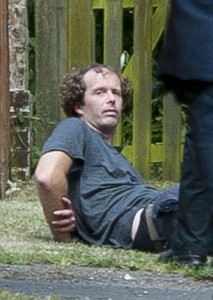
A man accused of the ‘road rage’ murder of a retired solicitor had been wrongly diagnosed with Asperger’s, a court has heard.
Matthew Daley repeatedly knifed Donald Lock in the head, chest, back and neck after a low-speed crash in Findon, West Sussex, in July.
The 35-year-old denies murder on this grounds of diminished responsibility as he claims he was acting in self defence, because he’s believed he was about to be attacked.
The minor crash happened after great-grandfather Mr Lock, who was returning from a cycling meeting, was forced to brake suddenly after Daley made an emergency stop.
Lewes Crown Court heard that if Daley had been diagnosed sooner he might have been on medication that would have prevented him from stabbing 79-year-old Don 39 times.
Brighton and Hove Albion season ticket holder Mr Lock, who had recently been given the all-clear from prostate cancer, died at the scene as Daley sped off.
During his trial jurors were told that Daley was sent to maximum security HMP Belmarsh, where he was diagnosed for the first time with paranoid schizophrenia.
From the age of 25 doctors had believed Daley suffered from Asperger’s with some psychotic traits.
Dr Roderick Ley, a consultant forensic psychiatrist, told the court that Daley may never recover from his mental illness due to the length of time it took to diagnose it – and despite treatment he still hears the voices of children in his head.
He said: ‘Matthew is responding well, but he still says he is not suffering from a mental illness, but when pushed he reveals he still hears the high pitched voices of the children.
‘Although he is on medication and is being treated he hasn’t recovered from his underlying illness.
‘He had an untreated illness for a long time. It’s unlikely he will have a full recovery.
‘It is clear now that the diagnosis of Aspergers isn’t correct, it was wrong, he has an underlying paranoid schizophrenic illness that has been untreated for many years in my view that is irrefutable.’
Daley believed his mental illness was caused by an adverse reaction to penicillin.
David Howker, defending Daley, said: ‘He heard childhood voices, high-pitched, and voices calling from the TV.
‘He said he didn’t think he had a mental illness.
‘From the age of about 25 when he became unwell and thought he suffered a severe reaction to penicillin that caused him to be bed ridden for two months.
‘It was about that time he recalled starting to hear voices. He described them as young children, high pitched, in his head and terrifying.’
Dr Ley, who saw Daley on a regular basis since his admittance to Belmarsh and subsequently to Hellingly medium secure unit in November, assessed him in September.
He said: ‘He found the voices of children very disturbing and they upset him. He believed he was able to hear what people were thinking and believed he could interpret the emotions of that person.
‘This was how he came to explain his experiences. He believed he had an affinity with nature and animals and that he could pick up these emotions.’
From 2008 Daley was seen by the Early Intervention Services and Community Mental Health Team of Sussex Partnership NHS Foundation Trust, but was not diagnosed with paranoid schizophrenia despite reporting hearing voices.
Daley was only prescribed five to 10 milligrams of antic-psychotic olanzapine when he should have been on 15 to 20 milligrams to tackle his hallucinations and delusions, the court heard.
Dr Ley added: ‘He started suffering from paranoid schizophrenia from between 19 and 23 and over the years has a range of psychotic symptoms and auditory hallucinations.
‘It’s not straightforward making a diagnosis of paranoid schizophrenia.
‘Often there are a couple of years between first presenting with these symptoms and diagnosis, but for there to be a 13 to 15 year delay in diagnosis is highly unusual in my experience.
‘If someone is diagnosed with paranoid schizophrenia the way they engage with health services and the way they are managed is completely different.
‘If a paranoid schizophrenia patient presents without taking their medication and a range of symptoms they would be admitted to hospital. This was not the case as he was treated as if he merely had autism spectrum disorder.
‘Despite at times presenting to casualty and services, despite his parents being very concerned about his mental health, it didn’t lead to him being admitted to hospital.’
The court heard Daley would hide the nature of his illness because he was embarrassed and did not want to talk about it.
Dr Ley said: ‘This is an intelligent young man who managed to cope with his symptoms and was able to function without suffering a breakdown that needed him to be taken to hospital.’
During the summer of 2014 Daley had a fight with a man outside a pub, after thinking the stranger was making sexual comments about his girlfriend.
Dr Ley added: ‘He held the man down and asked him ‘do you yield’, friends of the man came out of the pub and started kicking him.
‘He also believed his girlfriend was coming into the prison and having sexual intercourse with other inmates.’
Staff at Belmarsh were concerned he would act on these thoughts and was kept in solitary confinement until he was transformed to Hellingly in East Sussex.
Since arriving at Hellingly, Dr Ley said Daley has been the victim of verbal abuse and taunts, but has ‘not acted in an aggressive manner’.
He added: ‘It is unusual for someone with psychotic symptoms to not report these episodes.
‘In my view his psychotic experiences affected his judgment and impaired his ability to make a decision about his actions.
‘If he had been diagnosed earlier things could have happened differently.’
Cross examining Dr Ley, Philip Bennetts prosecuting said: ‘Mr Daley knew what he was doing, knew he was stabbing and knew what he was doing was wrong.
‘There’s no evidence of Mr Daley being psychotic then, there’s not a witness who described him as acting psychotic.
‘The only account of Mr Lock’s reaction is from Mr Daley, he is the only witness to have seen his facial features.
‘Mr Daley reacted angrily. He described how he was happy earlier in the day. That is consistent with road rage isn’t it?
‘He had done a U-turn in that road before so it was inevitable this would cause someone arriving along that road to brake suddenly.’
Dr Ley replied: ‘One explanation is that this was simple road rage. But descriptions from the family is that he isn’t a violent man or had a violent nature.
‘Witnesses saw Mr Lock get out of his car acting calmly. So either Mr Daley is lying about what happened or he was suffering from psychosis.
Daley visited a prostitute called Hannah in Brighton the night before the killing of Mr Lock, consultant forensic psychiatrist Dr Philip Joseph told the court.
Daley paid her between £60 and £80, and went straight home following sex, telling Dr Joseph in an interview that he ‘slept well’ that night.
All his previous sexual encounters had been with prostitutes, even using his girlfriend’s money for their services, jurors were told.
Since 2008, there had been records that Daley suffered from mental illness, which could be dated to around the time his parents’ marriage broke down while he was at university.
Dr Joseph said that when Daley first came to the attention of mental health teams, it was deemed that he had schizophrenia, but the diagnosis was later revised to autism.
In the months before the killing, Daley had stopped taking his medication, saying it affected his driving.
Regardless of whether Daley was paranoid schizophrenic or on the autistic spectrum with episodes of psychosis, the key question for jurors was whether he was psychotic at the time of the stabbing, he added.
Dr Joseph said he was satisfied on all the evidence he had seen that Daley was not psychotic at the time, pointing to the absence of audio hallucinations as an example.
John Daley described his father as a ‘nice guy’ who was affectionate to his family and animals.
At Lewes Crown Court, Mr Daley said: ‘He has never been violent. It’s never been in any of his family.
‘It’s so far removed from Matthew to say there is any violence in him. He was just so friendly to animals, his brother and sister.
‘He was just a nice guy.’
He added: ‘He was scrupulously honest in all his dealings with others, honest to a fault in that he finds it difficult to lie about things.’
Mr Daley spoke of how he first became worried about his son’s mental health when he reported hearing voices.
And as University of Portsmouth architecture graduate Daley’s health declined, his father started a journal, partly to keep track of his son’s treatment.
He told the court: ‘The second reason for having the document was, as time went on, it was clear that Matthew’s life expectations were draining away and I didn’t want to be in my 80s and look back saying, ‘What did I do’?’
Growing up, Mr Daley said his son was ‘an ideal child’ but was ‘quiet, shy and reserved’.
The hearing continues.
Taken From DailyMail.Co.Uk
